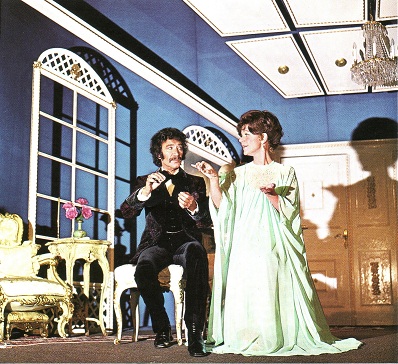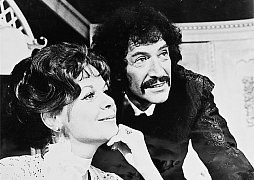
The English Theatre, Vienna, Austria: 1977
Character: George Bernard Shaw
“Wyngarde’s sharply-etched performance was a triumph of acting, employing a Cheshire Cat grin and a look of self-satisfaction when tossing off a bon mot – of which ‘Dear Liar’ has many”.
As with most literary personalities, there’s been much written about Shaw’s work. However, the average theatregoer would probably be unacquainted with the private concerns of the man who wrote ‘Pygmalion’ [1], and who won both a Nobel Prize for Literature and an Academy Award, but who, latterly, turned down a knighthood.
‘Dear Liar’ was written by Jerome Kilty in 1957, and was first performed on Broadway in 1960. In this production, American actress and founder of the Viennese English Theatre, Ruth Brinkmann, plays Mrs Campbell , with Peter Wyngarde as her testy paramour, George Bernard Shaw.
The play recounts the (purportedly) unconsummated affaire de plume between the playwright and actress that lasted for over forty years. As in the much more recent Vita & Virginia [2], ‘Dear Liar’ is what might be described as a “epistolary drama”, which involves the actors narrating and then reading aloud the letters exchanged between the characters.
Shaw was a prolific letter-writer, who traded correspondence with such luminaries as G.K. Chaterton, H.G. Welles and Michael Collins (amongst others), but it was Mrs Beatrice Sella Campbell, who proved to be his passion and muse.

There is little doubt that Kilty did a stellar job in entwining the innumerable strands of the story, and the two actors were skilful and polished; injecting spirit and vitality into both figures.
Portraying the sophisticated and tasteful leading lady in ‘Dear Liar’ had become something of a formality for Ruth Brinkmann by the time she and Peter took to the stage in 1976, having played her at the English Theatre several times during the 1960’s and early 70’s [3] – on each occasion being directed by her husband, Franz. Of particular note in Brinkmann’s performance was her comical depiction of Mrs Campbell playing Eliza Doolittle [4] to Shaw’s Professor Henry Higgins; endeavouring to transmute her voice from that of a native of Kensington into that of a Covent Garden flower girl. With gusto Brinkmann, as the theatrical diva, shrieked and squawked through her lines as she prepared for the part while Peter, as Shaw, grumbled, bullied and criticised the demoralised actress.
For his depiction of the egocentric writer, Peter, decided to forgo the familiar grey-whiskered appearance most familiar of Shaw, instead he opted to keep the droopy Jason King moustache and cascade of dark brown curls in which to play the influential playwright and theatre critic. The wearing of a pair of half-moon spectacles in the second half of the play was the only compromise he made to indicate the passage of time. Nevertheless, he offered a fiery performance; at times roaring his thoughts, feelings and contradictions both passionately and enthusiastically, and portraying the dramatist as both self-centred and yet caring.
The letters that were exchanged between the two were filled with wordplay, vitality and, sometimes, acrimony. The two discussed art, philosophy and politics, alongside their own hopes and dreams. As an actor, Peter has always been adept at briskly moving from enthusiastic rough-and-tumble to passionate feeling – as he was required to do when reading news of Campbell’s son, who’d fought in the Great War, or when discussing something more frivolous. It was these sharp mood changes that disclose the understanding that lay beneath Shaw’s hot-headedness and petulance. Peter also managed to control Shaw’s brisk patois commendably, too, whilst rapidly firing off the scribes impatient histrionics as surly as if he’d penned them himself.
The simplistic stage backdrop ensured that all attention remained, quite rightly, remained on the two players. The only furniture was two wooden chairs, though the tea cups, lamps and paperweight were imagined.
Whilst the letters between the two were alive with deep thought, punch and often rancour, one was left with the feeling that there was a huge void across which neither Campbell nor Shaw could ever transcend. Clearly, both these individuals were far more absorbed by their own notions and feelings than they were with the others.
The following comes courtesy of The English Theatre, Vienna
Beatrice Sella Campbell was not only one of the greatest English actresses at the beginning of the Century but was, for decades, an intimate soulmate of playwright, George Bernard Shaw. Jerome Kilty dramatized the sometimes very active correspondence to create a highly successful collage of correspondence:

‘Dear Liar’ is a piece of theatrical history, but above all a mosaic of the intimate relationship of two great theatrical personalities. This summer sees the fourth production of ‘Dear Liar’, again under the skilled direction of Franz Schaffranek. Ruth Brinkmann again plays Stella excellent as an actress at the height of her triumphs. Evidently capable of taming the shrewish, egocentric Shaw.
Peter Wyngarde, who achieved international fame since appearing in 53 countries as the dandified agent Jason King in the TV series, Department S, does not resemble Shaw in appearance, only in his Emerald isle dialect, and bring the dramatic monument down from his pedestal, showing Shaw the man, with all his weaknesses. Particularly moving his relation of the cremation of his mother, and uproariously funny is the ‘Pygmalion’ rehearsal. Without doubt, this ‘Dear Liar’ is another feather in the English Theatre’s cap.
Taken from the Wiener Zeitung
By Johann Werfring
When the young New Yorker actress Ruth Brinkmann planned a three-day stay in Vienna in 1959, this should have a lasting impact on the cultural life of the Austrian federal capital. On the very day she arrived, she witnessed the theatrical performance of Schnitzler’s “Das weite Land” with Paula Wessely. “In a city where you play such a theater, I would like to stay,” she thought to herself, as she later explained in a newspaper interview.
Shortly thereafter, the well-traveled tourist at the Café Hawelka in Vienna’s inner city met the now legendary poet H. C. Artmann, who introduced her to a young director of the Burgtheater in Vienna, to whom she gave the answer a year later: Franz Schafranek.
In 1963, they performed the first production with Jerome Kilty’s “Dear Liar”. With Ruth Brinkmann’s “Dear Liar” partner Anthony Steel, there was a powerful name. Everything went well, and as a result not only Viennese-speaking Viennese tourists, but also Viennese more and more arose in the performances.
Of course the first time had not been a honey lick. At first Franz Schafranek, the director, distributed copied notes during the day and sat at the cash desk in the evening. But the hard work was worth it, because the artistic professionalism gained not only in the country itself but also internationally high recognition.
From 1974, Vienna’s English Theater was a permanent venue in Josefsgasse in Josefstadt. Numerous stars, including Joan Fontaine, Anthony Quinn, Leslie Nielsen, Linda Gray, Larry Hagman, and Gracia Patricia of Monaco, have been successful. Peter Wyngarde, also known as “Jason King”, worked with “Dear Liar” in 1977.
Also the “School tours”, which currently bring hundreds of performances to 250,000 pupils all over Austria, contributed to the fact that the theater became an Austrian “institution”. In the meantime, Julia Schafranek, daughter of the two founders, has been very successful.
| Notes: [1] The film ‘My Fair Lady’ is based on the play, ‘Pygmalion’. [2] ‘Vita & Virginia’ (1992). A drama based on the correspondence between Vita Sackville-West and Virginia Woolf. [3]. 1963, 1972, 1973, and 1974. [4] Campbell played Eliza Doolittle in ‘Pygmalion’, which premiered at His Majesties Theatre, London, on 11 April, 1914. |
© Copyright The Hellfire Club: The OFFICIAL PETER WYNGARDE Appreciation Society: https://www.facebook.com/groups/813997125389790/


One thought on “REVIEW: Dear Liar”